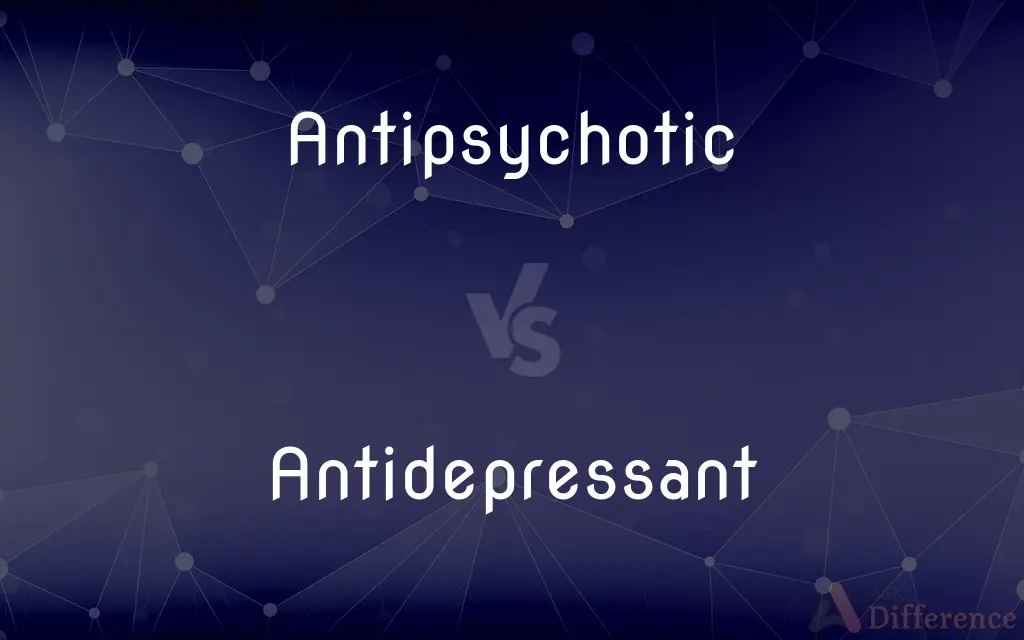Antipsychotic vs. Antidepressant — What's the Difference?
Edited by Tayyaba Rehman — By Fiza Rafique — Updated on April 15, 2024
Antipsychotics are primarily used to manage psychosis, including hallucinations and delusions, while antidepressants treat depression and anxiety by altering neurotransmitter levels.

Difference Between Antipsychotic and Antidepressant
Table of Contents
ADVERTISEMENT
Key Differences
Antipsychotics are designed to treat psychiatric conditions such as schizophrenia, bipolar disorder, and severe psychotic depression by targeting neurotransmitter systems like dopamine. On the other hand, antidepressants focus primarily on the serotonin and norepinephrine systems to alleviate symptoms of depression, anxiety, and certain mood disorders.
Antipsychotics work by blocking dopamine receptors in the brain, which helps to control symptoms of psychosis such as hallucinations and delusions. Whereas, antidepressants increase the levels of neurotransmitters like serotonin and norepinephrine in the brain, which can improve mood, sleep, and energy levels.
The side effects of antipsychotics can include drowsiness, weight gain, and sometimes tremors or other movement disorders, reflecting their powerful neurochemical effects. In contrast, common side effects of antidepressants might include nausea, insomnia, and changes in appetite.
Antipsychotics are often prescribed in more severe cases of mental health disorders where psychosis is evident, indicating their strong and targeted action on brain chemistry. Meanwhile, antidepressants are typically used for a broader range of conditions, from mild to severe depression, as well as for chronic anxiety disorders.
While antipsychotics are generally not considered addictive, their withdrawal can be complex and must be managed carefully. Conversely, some antidepressants, particularly SSRIs, can lead to withdrawal symptoms, which need to be managed by gradually reducing the dose.
ADVERTISEMENT
Comparison Chart
Primary Use
Managing psychosis
Treating depression and anxiety
Neurotransmitters
Targets dopamine
Targets serotonin and norepinephrine
Common Side Effects
Drowsiness, weight gain, tremors
Nausea, insomnia, appetite changes
Prescription Context
Severe mental disorders with psychosis
Broad range of depressive and anxiety disorders
Withdrawal Complexity
Complex but non-addictive
Possible withdrawal symptoms
Compare with Definitions
Antipsychotic
Medication used to manage psychosis.
He started taking an antipsychotic for his schizophrenia.
Antidepressant
Gradual withdrawal recommended.
To avoid withdrawal symptoms, antidepressants must be tapered off slowly.
Antipsychotic
Treats severe mental health issues.
The antipsychotic helped reduce her hallucinations.
Antidepressant
Increases serotonin levels.
SSRIs, a type of antidepressant, increase serotonin to improve mood.
Antipsychotic
Used in bipolar disorder treatment.
Antipsychotics can stabilize mood swings in bipolar disorder.
Antidepressant
Medication that regulates mood.
She was prescribed an antidepressant to help with her depression.
Antipsychotic
Sometimes causes movement disorders.
Antipsychotic use is carefully monitored due to potential side effects like tremors.
Antidepressant
Often used for anxiety.
Antidepressants can also alleviate symptoms of anxiety.
Antipsychotic
Blocks dopamine receptors.
Antipsychotics are effective due to their dopamine-blocking effects.
Antidepressant
Can cause insomnia.
One of the side effects of his antidepressant is insomnia.
Antipsychotic
Antipsychotics, also known as neuroleptics, are a class of psychotropic medication primarily used to manage psychosis (including delusions, hallucinations, paranoia or disordered thought), principally in schizophrenia but also in a range of other psychotic disorders. They are also the mainstay together with mood stabilizers in the treatment of bipolar disorder.Recent research has shown that use of any antipsychotic results in smaller brain tissue volumes and that this brain shrinkage is dose dependent and time dependent.
Antidepressant
A drug used to treat depression.
Antipsychotic
Counteracting or diminishing the symptoms of psychotic disorders, such as schizophrenia.
Antidepressant
(pharmaceutical drug) An agent that prevents or counteracts depression.
Antipsychotic
An antipsychotic drug.
Antidepressant
(pharmaceutical effect) Preventing or counteracting depression.
Antipsychotic
(pharmaceutical effect) Preventing or counteracting psychosis.
Antidepressant
Any of a class of drugs used to treat depression; often have undesirable side effects
Antipsychotic
(pharmaceutical drug) Any of a group of drugs used to treat psychosis.
Antipsychotic
Tranquilizer used to treat psychotic conditions when a calming effect is desired
Common Curiosities
What should be considered when stopping these medications?
Both types require careful management when stopping; antipsychotics need gradual withdrawal due to complex effects, and antidepressants can cause withdrawal symptoms.
How do the side effects of antipsychotics and antidepressants differ?
Antipsychotics often cause drowsiness and weight gain, while antidepressants might lead to insomnia and changes in appetite.
Can antidepressants be used for conditions other than depression?
Yes, antidepressants are also commonly prescribed for anxiety disorders and certain chronic pain conditions.
What are antipsychotics mainly used for?
Antipsychotics are primarily used to treat disorders with psychosis such as schizophrenia.
How do antipsychotics and antidepressants affect neurotransmitters?
Antipsychotics mainly block dopamine receptors, while antidepressants increase serotonin and norepinephrine levels.
Are there any risks with long-term use of antipsychotics?
Yes, long-term use of antipsychotics can lead to movement disorders and metabolic issues.
Can both antipsychotics and antidepressants treat depression?
Yes, antipsychotics can be used for severe psychotic depression, while antidepressants are used for a broader range of depressive conditions.
What are the primary uses of antidepressants?
Antidepressants are used to treat depression, anxiety, and certain mood disorders.
Is addiction a concern with either type of medication?
Addiction is generally not a concern with antipsychotics or most antidepressants, though withdrawal needs management.
How are antipsychotics monitored during treatment?
Due to their potent side effects, antipsychotics require regular monitoring by a healthcare provider.
Share Your Discovery

Previous Comparison
Eavestrough vs. Gutter
Next Comparison
Relabeled vs. RelabelledAuthor Spotlight
Written by
Fiza RafiqueFiza Rafique is a skilled content writer at AskDifference.com, where she meticulously refines and enhances written pieces. Drawing from her vast editorial expertise, Fiza ensures clarity, accuracy, and precision in every article. Passionate about language, she continually seeks to elevate the quality of content for readers worldwide.
Edited by
Tayyaba RehmanTayyaba Rehman is a distinguished writer, currently serving as a primary contributor to askdifference.com. As a researcher in semantics and etymology, Tayyaba's passion for the complexity of languages and their distinctions has found a perfect home on the platform. Tayyaba delves into the intricacies of language, distinguishing between commonly confused words and phrases, thereby providing clarity for readers worldwide.














































